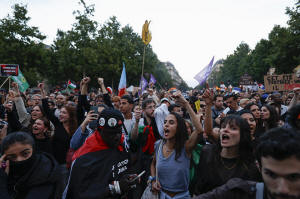France shifts to the left, risks policy paralysis
 Send a link to a friend
Send a link to a friend
 [July 08, 2024]
By Richard Lough and Tassilo Hummel [July 08, 2024]
By Richard Lough and Tassilo Hummel
PARIS (Reuters) -France faced a hung parliament and difficult
negotiations starting Monday to form a government, after a surprise
left-wing surge blocked Marine Le Pen's quest to bring the far right to
power.
The leftist New Popular Front (NFP) emerged as the dominant force in the
National Assembly after Sunday's election, but with no single group
securing a working majority the possibilities include the NFP forming a
minority government or the building of a broad, unwieldy coalition.
The result delivered a blow to President Emmanuel Macron and leaves the
euro zone's second largest economy in limbo, heralding a period of
political instability just weeks before Paris hosts the Olympic Games.
Macron ended up with a fragmented parliament, in what is set to weaken
France's role in the European Union and further afield, and make it hard
for anyone to push through a domestic agenda.
The left won 182 seats, Macron's centrist alliance 168 and Le Pen's
National Rally (RN) and allies 143, Interior Ministry data cited by Le
Monde newspaper showed.
"According to the logic of our institutions, Emmanuel Macron should
today officially invite the New Popular Front to nominate a prime
minister," said Green leader Marine Tondelier, one of a number of NFP
figures seen as potential candidates for the post.
"Will he or won't he? As this president is always full of surprises,
we'll see," she said on RTL radio.
Prime Minister Gabriel Attal said he would tender his resignation on
Monday, but it was not clear whether the president would accept it
immediately, given the daunting task ahead to form a government. Attal
said he would be willing to stay on in a caretaker role.
DISSONANT VOICES ON THE LEFT
Leaders from the NFP met overnight for first talks on how to proceed,
but in media interviews on Monday they gave little sense of direction.

Tondelier said on France Inter radio the prime minister could be someone
from the hard-left France Unbowed party, the Greens or the Socialists,
the three largest parties in the alliance.
Olivier Faure, the Socialist leader, said on France Info radio that he
expected the parties to agree on a plan this week, but sidestepped a
question on whether the NFP would be prepared to negotiate a deal with
Macron's centrist camp.
Raphael Glucksmann, a prominent moderate who led the leftist ticket in
last month's European elections, said on Sunday that a hung parliament
required openness for dialogue.
But France Unbowed's firebrand leader Jean-Luc Melenchon, one of the
most divisive figures in French politics, explicitly ruled out any deal
with centrists on Sunday, and on Monday his ally Eric Bompard was
sounding uncompromising.
"The president must appoint as prime minister someone from the New
Popular Front to implement the NFP's program, the whole program and
nothing but the program," he said on France 2 television.
[to top of second column]
|

People raise their arms and hands as they gather at the Place de la
Republique after partial results in the second round of the early
French parliamentary elections, in Paris, France, July 7, 2024. The
slogan reads "the "Nouveau Front Populaire (New Popular Front - NFP)".
REUTERS/Abdul Saboor

Challenged on how that would be possible without an absolute
majority, Bompard refused to engage with the question, insisting
that as the NFP had come first, it should govern and shrugging off
the idea of negotiating with anyone else.
However, there is little chance that any of the left-wing bloc's key
proposals, which include raising the minimum wage, reversing
Macron's pension reform and capping the prices of key goods, would
pass a parliamentary vote without some kind of agreement with
lawmakers from outside the bloc.
CENTRISTS OPEN TO NEGOTIATION
Some prominent centrist figures, including Edouard Philippe, a
former prime minister under Macron, said they were ready to work on
a pact to ensure a stable government, but were not prepared to work
with France Unbowed, a force seen by many French centrists as just
as extremist as the RN.
Yael Braun-Pivet, a lawmaker from Macron's party who was the
National Assembly leader before the election, said French political
culture would have to evolve, becoming less antagonistic and more
cooperative across party lines.
"The message I'm hearing from voters is 'no one has an absolute
majority, so you have to work together to find solutions to our
problems'," she said on France 2 television.
The euro slipped on Monday by as much as 0.4% as investors grappled
with the uncertainty in Paris.
"There's really going to be a vacuum when it comes to France's
legislative ability," said Simon Harvey, head of FX analysis at
Monex Europe in London.
For Le Pen's RN, the result was a far cry from weeks during which
opinion polls consistently projected it would win comfortably.
The left and centrist alliances cooperated after the first round of
voting last week by pulling scores of candidates from three-way
races to build a unified anti-RN vote.
In his first reaction, RN leader Jordan Bardella, Le Pen's protege,
called the cooperation between anti-RN forces a "disgraceful
alliance" that he said would paralyze France.
Le Pen, who will likely be the party's candidate for the 2027
presidential election, said however that Sunday's ballot, in which
the RN made major gains, had sown the seeds for the future.
"Our victory has been merely delayed," she said.
(Additional reporting by Jean Terzian, Ingrid Melander and Sudip Kar-Gupta;
Writing by Richard Lough and Estelle Shirbon; Editing by Janet
Lawrence)
[© 2024 Thomson Reuters. All rights reserved.]This material
may not be published, broadcast, rewritten or redistributed.
Thompson Reuters is solely responsible for this content.
 |